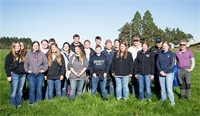WORDS & IMAGE SUPPLIED BY BEEF + LAMB NEW ZEALAND
The economic outlook, coupled with predicted El Niño weather patterns, means the next few months could be challenging for farmers.
Beef + Lamb New Zealand’s New Season Outlook 2023–24 is forecasting farm profitability to fall by 31 per cent to an average $88,600 per farm (this is a weighted average
across all farm classes). This follows on the back of last year’s 32 per cent decline and means profits for farmers have more than halved in two years. This is a 15-year low, when inflation is taken into account.
This reflects the cyclical of nature of markets and farming and B+LNZ’s recent ‘Sow, Grow, Thrive’ webinar series highlighted a number of strategies farmers can implement that will help them get through this pinch and come out in a stronger position when the inevitable upward swing occurs.
A number of the speakers, which included farmers, bankers, farm accountants, financial advisors, and a psychologist, encouraged farmers to focus on the factors they can control and to take this opportunity to run a ruler over their business to find where incremental gains could be made. All stressed the importance of planning as the cornerstone of achievement and the need to revisit plans on a regular basis.
Farmer experience
Speaking on the first of the six webinars, sheep and beef farmers Matt Tayler and Pat Crawshaw discussed their strategies for navigating what could be a challenging season ahead. These include changing their mindset and taking the opportunity to reassess what drives their business. They will also be looking at ways they can make incremental savings and instill business disciplines that will put them in a good position to recover quickly.
Matt and his wife Shona farm Lorne Peak, a 6000ha sheep and beef operation near Garston in Southland. He described adversity as being a great learning experience and it has been through periods of adversity that they have changed their farming system for the better. While they are carrying a lot of debt on the back of a recent growth and development phase, Matt says he is feeling energised about the opportunity to reset their business, although it has taken him a few months to adopt that mindset.
Over the five years Pat Crawshaw and his wife Isabelle have been farming at Patoka in Hawke’s Bay they have faced drought, a TB outbreak, Covid-19, a slew of government regulations, and cyclones; the latter being by far the most destructive and disruptive. They were also a B+LNZ Monitor Farm and the support networks they put into their business over that time are now standing them in good stead.
On top of having to rebuild their farm system after the devastation wrought by Cyclone Gabrielle, interest rates on their considerable debt have more than doubled.
Pat describes interest rates (as a percentage of their Gross Farm Income) as their biggest challenge and this puts a huge amount of pressure on them. It is also a factor they cannot control. He says they are very frank with their bank manager about what that looks like for them, but their focus is on the factors they can control.
Pat stresses the importance of having good long-term relationships with the many people in the farm team (accountants, bank managers, processors, fertiliser reps, agronomists etc) who can offer support, advice and reward loyalty. Both Matt and Pat talked about having trigger points in their businesses (Matt’s are climate related) and having plans B, C and D ready to implement. Pat uses Farmax modelling, which includes soil moisture and temperature data, as a decision- making tool and every month he reviews how they are tracking financially. A more in-depth budget review is carried out every two to three months.
Both Matt and Pat talked about the need to get off-farm on a regular basis to play sport or catch up with friends as ways to connect and look after their own well-being.
For more information click here to visit Sow, Grow, Thrive: A B+LNZ webinar series to empower farmers for financial success.
Back to Real Farmer
Related

Unsightly piles of used tyres that occasionally make the news with spectacular and environmentally d...
Read More

Caitlin Hyde is completing her PhD on the appeal of eating insects in New Zealand. She has chosen a ...
Read More

A visit from South Dakota State University students to Mid Canterbury farms is a win-win.
Read More